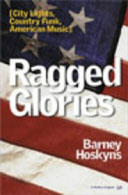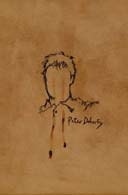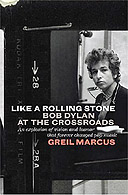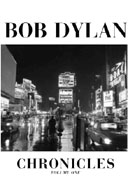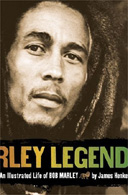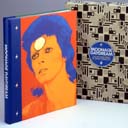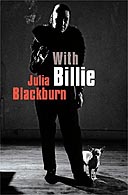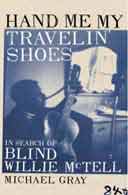Jake Arnott is tucking into a plate of guinea fowl at St John, his local restaurant in London's Clerkenwell, and worrying about David Bowie. The sophisticated fusion of gangsterism, showbusiness, politics and gay culture in Arnott's 'gangland trilogy' - The Long Firm, He Kills Coppers and truecrime - has earned him much acclaim and at least one superstar fan. On the covers of his novels, there is an approving quote from Bowie: 'Whenever he's got a new book out, I drop everything, knowing that the next couple of hours are going to be pure gangland bliss.'
Although that summary sells Arnott short - his work is a critique, not celebration, of gangland - that's not why he's worried. Bowie has been 'inspirational' to Arnott, who is a 'fantastically huge fan', and he isn't sure how the singer will react to his new novel, Johnny Come Home, which is set in the early Seventies world of glam rock, the pop phenomenon Bowie pretty much created.
Looking at Arnott, you wouldn't imagine that much would worry him or that he would be star-struck. At 45, he has a confident, relaxed manner - maybe that's the t'ai chi he performs every day - but also a somewhat forbidding exterior. One journalist spoke of his 'brutal good looks' and although that sounds like gush, he has always struck me as a potential contender to play James Bond.
He combines wariness with frankness, but is easy to talk to and can be very funny. He says: 'It's best not to worry about what Bowie might think. There's a character in the new novel called Sweet Thing, whose name comes from one of the songs on Diamond Dogs. It's one of my many direct steals from Mr Bowie, which is why I think he might not like this book.'
However, Arnott hasn't done a Velvet Goldmine and provided a fictional account of Bowie's life at the time. 'Given my strange proclivities,' he adds with a laugh, 'I preferred to focus on the seedy end of glam.'
The new novel is more ambitious than anything he has produced to date. Although it still has his trademark mix of true stories and fictional characters, he has moved away from the obvious attractions of gangland. While he touches on the early days of modern terrorism in the UK, Johnny Come Home is essentially a sophisticated account of that overheated period in the early Seventies when political radicalism, music and the blurring of sexual boundaries overlapped and sometimes fused.
There's the rent boy (Sweet Thing), squat-dwelling political activists and a gay, glam-rock star. This last character is not a Bowie or a Bolan, but one of those late Fifties-early Sixties survivors who changed their names each time they clambered on to the next musical wave. Johnny Rebel becomes Johnny Savage and almost becomes Johnny Flower before finding fame - in eyeliner, glitter and stack-heels - as Johnny Chrome.
Arnott is quick to say that Chrome is an echo rather than a fictional representation of real glam rockers. 'Certainly not the Unmentionable Man of Pop in a Vietnam prison,' he says, alluding to Gary Glitter. 'Although there is an edginess about the fact that glam rock was all about teenyboppers - underage girls - screaming at gigs.'
Edginess is a word Arnott uses often. His fiction operates on various edges, which is why he doesn't like to be categorised. To me, he is the heir to both Patrick Hamilton and Graham Greene in the way that he deals with lives on the margins, shabby glamour, underworlds of different sorts.
'I'm interested in things that don't quite fit in, as were those writers,' he acknowledges. 'It's a middle-class thing - people terrified of falling through the cracks in the floorboards. Brighton Rock is an iconic book for me. Orwell had that too.' He sees his work in the way that Orwell did. 'This is very old school but I do think there is a duty to have a sense of political context.' He shrugs. 'Because it's going to be imposed on you anyway.'
In his mid-forties, Arnott has really hit his stride. It has probably helped that he came to fiction late. Brought up in Aylesbury, the son of a management consultant, he left school at 16 and spent 20 years in a range of situations: mortuary technician, life model, political activist, squatter, agitprop actor.
He was living in Leeds, working in social services, one unpublished novel in his drawer, when he had the idea for The Long Firm. 'Ronnie Kray had just died and everyone had talked about how the Krays looked after their neighbourhood but nobody seemed to look at the gay aspect. So I wanted to write about someone who was sexually and emotionally involved with an East End psychopath. I knew I was on to something.'
The book was a huge success, as was last year's Bafta-nominated television version, and changed his life. When it became an immediate bestseller in 1999, two other things happened. First, he became a poster boy for gay fiction. Second, his work was lumped in with all the crass 'gangster/geezer chic' stuff surrounding Lock, Stock and Two Smoking Barrels and the lad mags' fêting of Essex thugs who had written memoirs of the good old days of intimidation and violence. He satirised 'mockney' gangster chic in truecrime.
His attitude to being highlighted as a gay writer somewhat more complicated. 'I like the fact that The Long Firm was selected as a Big Gay Read because it's an unexpected gay read - it turns conventions of gay fiction on their heads. But I don't want to be stuck in one category, either as an artist or as a human being. There are areas where people find their definitions are not enough. That's how I feel as a sexual human being.' He waves his fork over his plate. 'A strange phrase to use over lunch but I don't necessarily feel a fixed sexual identity is enough as an emotional person. I don't feel I fit in that way.
'I think that's what is interesting about this glam-rock period. There was gay lib and women's lib but there was exploration of sexual liberation for everyone. It might seem ludicrous now but it links to the notion I have that rock stars should always have an ambiguous sexuality. They are appealing to adolescents who are finding out about themselves, so that ambiguity is important. It certainly was to me - glam rock was a coming-of-age thing for my generation.'
Indeed, Johnny Come Home explores sexuality rather than just homosexuality. It also has a more complete merging of the personal and the political than any of his earlier novels. Curiously, Arnott sees glam rock as a form of music hall, though perhaps that just reflects his long-term interest in vaudeville. (Both his paternal grandparents were in music hall and variety.) In the novel, he talks of glam rock as 'music-hall futurism' and 'the lost years of British vaudeville'.
'I thought of calling Johnny "Johnny Vaudeville" but that sounded too American and there is something very English about glam rock. And music hall or variety is such a defining part of our culture.' Arnott concludes, pushing his plate away, by noting that even the young David Bowie was strongly influenced by Anthony Newley and the English show tradition. Maybe he'll like Johnny Come Home after all.
Jake's progress
Born 1961, Aylesbury, Buckinghamshire
Education Aylesbury Grammar
Work Played a mummy in Stephen Sommers's 1999 film The Mummy
Novels First novel The Long Firm (1999) was filmed for the BBC with Derek Jacobi and Mark Strong (right); He Kills Coppers (2001); truecrime (2003); Johnny Come Home (2006)
Awards The Crime Writers' Association Dagger in the Library 2005
He says 'I learnt to read by scanning the backs of trashy thrillers and this has had a woeful influence on my prose style ever since.'
They say 'Pulp fiction so polished as to be immaculate.' New Statesman
'Every bit as cool, stylish and venomous as the London in which it is set, an English original, streetwise in its lingo and as sharp and lethal as a Savile Row lapel.' The Independent on The Long Firm
'A brazenly confident writer, Arnott perfectly nails Sixties England in all its contradictions.' Boston Globe
· Olivia Laing

